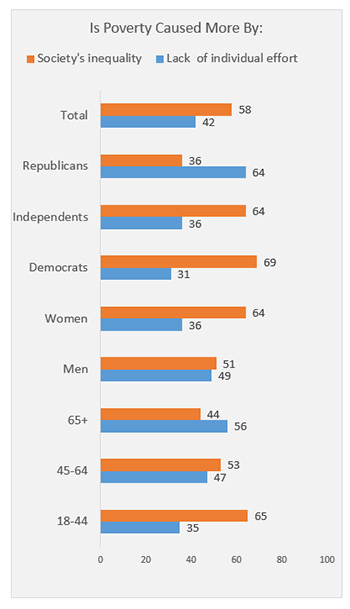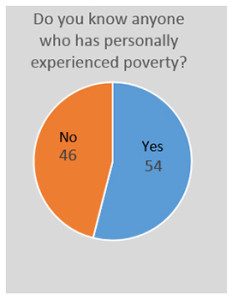Society or the Individual: Root Causes of Poverty in America
1/25/2016
The new Fishlinger Center for Public Policy Research at the College of Mount Saint Vincent seeks to foster meaningful dialog on key public policy issues through independent, objective public opinion research. This initial survey focuses on social issues in the United States. This is the third report from the survey; the first two reports concentrated on human trafficking and the lack of affordable health care. Additional reports on other social problems covered in the survey will be released in the coming months.
The poll was conducted online May 14 to 26 with 1,253 adults. Field work was conducted by IPSOS Public Affairs. Blacks, Hispanics, and Asians were sampled at a higher rate than their proportion of the population for reasons of analysis.
Importance of the Issue
Three-quarters of the public describe poverty as an extremely or very important issue in the United States and about the same number consider it to be extremely or very serious.
Forty percent of the public say they are extremely or very interested in helping to reach a solution for poverty in the United States. But, only a third say they actually have personally tried to help poor people.
The Cause of Poverty
Most Americans say poverty is the result of inequity in society rather than an individual’s own fault. Two-thirds of the public consider poverty a pervasive problem in the United States and more than a quarter consider themselves poor.
Nearly sixty percent of Americans say the basis for poverty in this country is an unequal society, while about forty percent say a lack of effort on the part of an individual is more to blame.
 Democrats and independents, liberals and moderates are more inclined to fault society for poverty, while most Republicans and conservatives attribute poverty to the individual. About half of men and nearly two-thirds of women say society is responsible for poverty. Older Americans are more likely to fault the individual, while younger people are more likely to regard poverty as the product of inequity.
Democrats and independents, liberals and moderates are more inclined to fault society for poverty, while most Republicans and conservatives attribute poverty to the individual. About half of men and nearly two-thirds of women say society is responsible for poverty. Older Americans are more likely to fault the individual, while younger people are more likely to regard poverty as the product of inequity.
More than two-thirds of people who consider themselves poor see poverty as the product of society; people who do not think of themselves as impoverished are more closely divided on the cause of poverty.
Few Americans say the problem of poverty is being adequately addressed in this country. Only 21 percent say impoverishment is being tackled to any real extent. Even a quarter if those who consider poverty an individual’s failing say the problem is not being dealt with very well or at all.
Experience with Poverty
More than half of all Americans say they personally know someone who has experienced poverty. Sixty percent of African-Americans say they know someone who has been poor compared with 54 percent of whites. People aged 65 and older are less likely to say they know someone who has been poor than younger adults.
 In a separate question, a quarter of the public say they consider themselves poor. Of those who say they are poor, about two-thirds place themselves in the working class or lower income. A third, however come from the middle and higher classes. When asked why they consider themselves poor, nearly half cited low pay or lack of money. Three in 10 referred to other shortages, such as health insurance, housing or food. And another quarter mentioned a lack of job employment opportunities.
In a separate question, a quarter of the public say they consider themselves poor. Of those who say they are poor, about two-thirds place themselves in the working class or lower income. A third, however come from the middle and higher classes. When asked why they consider themselves poor, nearly half cited low pay or lack of money. Three in 10 referred to other shortages, such as health insurance, housing or food. And another quarter mentioned a lack of job employment opportunities.
Using self-reported household income and U.S. Census definitions of poverty, the public can be divided into those below and above the poverty line. Eighty-five percent of survey respondents are above the poverty line, based on their reported household income; 15 percent are below the poverty line. This ratio is the same as reported by the Census Bureau for the country.
A third of those whose income may place them below the poverty level do not perceive themselves as poor. These people are younger, more likely to have never been married and less likely to have children than low income people who do consider themselves impoverished.
Survey Methodology
The fieldwork for the Fishlinger Center poll was conducted by Ipsos Public Affairs. Online interviews with 1,253 adults were collected May 14 to 26, 2015. Sampling for the survey used a blended approach, combining the Ipsos iSay panel with Ampario sample (a blend of external panel and non-panel sources). Ipsos measures the precision of its online surveys using a credibility interval to measure sampling error. The survey of 1,253 respondents has a credibility interval of plus or minus 2.8 percentage points. The credibility interval may be larger for subgroups. The poll is subject to other potential sources of error, including, but not limited to coverage and measurement error. Data were weighted to match the national population on age, sex, Hispanic origin and race. For purposes of analysis, black, Hispanic, and Asian respondents were oversampled. These groups were then weighted down to their proper proportion of the population.
About the Fishlinger Center for Public Policy
The Fishlinger Center for Public Policy Research opened in February 2015 at the College of Mount Saint Vincent. The Center, a member of the American Association for Public Opinion Research (AAPOR), conducts deep and broad studies of public opinion on key public policy concerns through independent and objective research conducted by students, faculty, and other members of the academic community.
By providing a forum for discourse that can stimulate intelligent dialog about issues that deeply affect all Americans, the Center illustrates and enhances the relationship between the work of the College and the common good.
About the College of Mount Saint Vincent
Founded in 1847 by the Sisters of Charity, the College of Mount Saint Vincent offers nationally recognized liberal arts education and a select array of professional fields of study on a landmark campus overlooking the Hudson River. Committed to the education of the whole person, and enriched by the unparalleled cultural, educational and career opportunities of New York City, the College equips students with the knowledge, skills and experiences necessary for lives of achievement, professional accomplishment and leadership in the 21st century.
